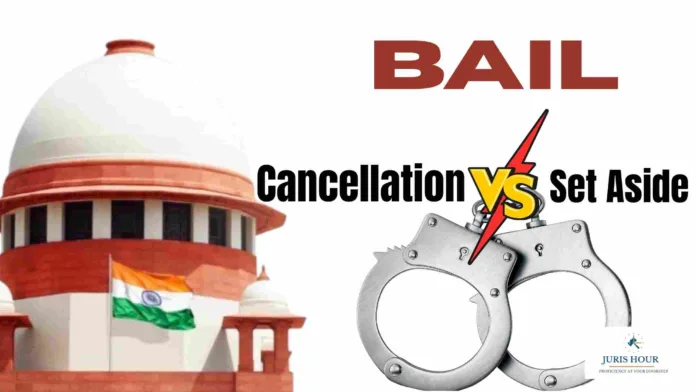The Supreme Court has reiterated a crucial distinction in criminal jurisprudence—between setting aside an order granting bail and cancellation of bail. The Court observed that while the former concerns the legality and correctness of the bail order itself, the latter pertains to the conduct of the accused after bail has been granted.
Court Clarifies Legal Position
The Bench emphasized that appeals challenging the grant of bail cannot be equated with applications for cancellation of bail. Citing precedents, the Court explained that an order granting bail can be interfered with if it is found to be illegal, perverse, arbitrary, or based on irrelevant considerations. In contrast, cancellation of bail requires supervening circumstances—such as misconduct of the accused, violation of bail conditions, or attempts to obstruct justice.
Precedents Reaffirmed
The judgment referred to several earlier rulings including Jayaben v. Tejas Kanubhai Zala (2022), Y v. State of Rajasthan (2022), and Neeru Yadav v. State of U.P. (2014), where the Court had consistently highlighted this distinction. In Meena Devi v. State of U.P. (2022), the Court underscored that the “yardstick for testing the correctness of an order granting bail” is whether the discretion was exercised arbitrarily, while cancellation must be based on subsequent developments.
More recently, in State of Rajasthan v. Indraj Singh (2025), the Court reiterated that bail should not be granted mechanically and that unreasoned or perverse bail orders remain open to interference by superior courts.
Principles Laid Down
The Court summed up the following key principles:
- Appeals against grant of bail and applications for cancellation of bail fall in different compartments.
- Courts must avoid detailed analysis of prosecution evidence at the bail stage.
- Bail orders must reflect consideration of relevant factors such as gravity of the offence, risk of tampering with evidence, or societal impact.
- Appeals against grant of bail may be entertained for reasons such as perversity, illegality, or non-consideration of relevant factors.
- Conduct of the accused after bail is not relevant in an appeal against the grant but is central in cancellation proceedings.
- Appeals should not be used as retaliatory measures.
Case Background
Applying these principles, the Supreme Court set aside the bail granted to an accused who had remained absconding after the registration of an FIR. Despite non-bailable warrants and a reward declared for his arrest, these critical facts were not considered by the High Court while granting him regular bail. The apex court held that such omissions rendered the order unsustainable.
Read More: Vintage Car Sale Taxable as Capital Gain; Assessee Fails to Prove Personal Use: Bombay High Court

